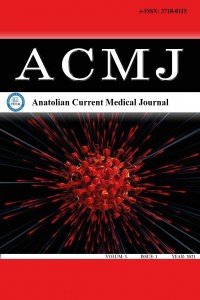Abstract
References
- Goldstein RS, Psek JA, GortEH. Home mechanical ventilation. Demographic sand user perspectives. Chest 1995; 108: 1581-6.
- EroğluA, Ulusoy H, ErciyesN. Mechanical venlation at home. O.M.U. Medical Journal 2003; 20: 28-31.
- Scrinivan S, Doty SM, White TR. Frequency causes, and outcome of home ventilatorfailure. Chest 1998; 114: 1363-7.
- Muir JF, Cuvelier A. Evaluation of candidates for long-term ventilation. Respir Care Clin North Am 2002; 8: 405-18.
- Wallis C, Paton JY, Beaton S, Jardine E. Children on long-term ventilatory support: 10years of progress. Arch Dis Child 2011; 96: 998-1002.
- Gowans M, Keenan HT, Bratton SL. The population prevalence of children receiving invasive home ventilation in Utah. Pediatr Pulmonol 2007; 42: 231-6.
- Hein H, Schucher B, Magnussen H. Quality of life of various patient groups during home mechanical ventilation. Med Clin 1999; 94: 99-101.
- KarakurtZ.Homemechanicalventilation.JournaloftheTurkishsocietyofintensivecare. 2004; 4: 145-50.
- Amin R, Sayal P, Syed F, Chaves A, Moraes TJ, MacLusky I. Pediatric long-term home mechanical ventilation: twenty years of follow-up from one Canadian center. Pediatr Pulmonol 2014; 49: 816-24.
- Simonds AK. Respiratory support for the severely handicapped child with neuromuscular disease: ethics and practicality. Semin Respir Crit Care Med 2007; 28: 342-54.
- Edwards EA, O’Toole M, Wallis C. Sending children home on tracheostomy dependent ventilation: pitfall sand outcomes. Arch Dis Child 2004; 89: 251-5.
Abstract
Aim: Although palliative care has recently become widespreadin the western countries, it has
not fitted on a solid base in our country yet. There is still no consensus on the admission criteria
to palliative care units. There is no widely used guidelines for the management of the patients
after invasive home mechanical ventilation (I-HMV).
In this study, we aimed to share our one-year clinical experience about the patients who were
transferred from intensive care unit (ICU) first to palliative care center then home with I-HMV.
The demographic and clinical data, education and discharge processes were evaluated.
Materials and Methods: The cases that used HMV used in the palliative care service between
July 2016 and September 2017 were retrospectively analyzed. The anesthesiologist was the
responsible physician of the palliative care center during this time period. The age, sex, primary
diagnosis and comorbidity of the patients were analyzed using statistical methods.
Results: Four patients (40%) were female and 6 (60%) were male, the mean age of thepatients
was 47,9 ± 16,39 years. Amyotrophic Lateral Sclerosis (ALS) was seen ın 4 patients and it was
the most commonly encountered indication for admission. The mean duration of stay in our
palliative care unit was 19,1±7,22days. The mean hospital stay was 19,1 days; the longest
hospitalization was 32 days and the shortest hospitalization was 9 days. Only 30% of the
patients have chronical disease Two (20%) patients had history of hypertension (HT), one (10%)
patient had chronic obstructive pulmonary disease (COPD).
Conclusion: The management of the critically ill patients with well coordination of intensive
care units and palliative care centers is a critical step to improve the quality of life scores for
patients were on I-HMV.
References
- Goldstein RS, Psek JA, GortEH. Home mechanical ventilation. Demographic sand user perspectives. Chest 1995; 108: 1581-6.
- EroğluA, Ulusoy H, ErciyesN. Mechanical venlation at home. O.M.U. Medical Journal 2003; 20: 28-31.
- Scrinivan S, Doty SM, White TR. Frequency causes, and outcome of home ventilatorfailure. Chest 1998; 114: 1363-7.
- Muir JF, Cuvelier A. Evaluation of candidates for long-term ventilation. Respir Care Clin North Am 2002; 8: 405-18.
- Wallis C, Paton JY, Beaton S, Jardine E. Children on long-term ventilatory support: 10years of progress. Arch Dis Child 2011; 96: 998-1002.
- Gowans M, Keenan HT, Bratton SL. The population prevalence of children receiving invasive home ventilation in Utah. Pediatr Pulmonol 2007; 42: 231-6.
- Hein H, Schucher B, Magnussen H. Quality of life of various patient groups during home mechanical ventilation. Med Clin 1999; 94: 99-101.
- KarakurtZ.Homemechanicalventilation.JournaloftheTurkishsocietyofintensivecare. 2004; 4: 145-50.
- Amin R, Sayal P, Syed F, Chaves A, Moraes TJ, MacLusky I. Pediatric long-term home mechanical ventilation: twenty years of follow-up from one Canadian center. Pediatr Pulmonol 2014; 49: 816-24.
- Simonds AK. Respiratory support for the severely handicapped child with neuromuscular disease: ethics and practicality. Semin Respir Crit Care Med 2007; 28: 342-54.
- Edwards EA, O’Toole M, Wallis C. Sending children home on tracheostomy dependent ventilation: pitfall sand outcomes. Arch Dis Child 2004; 89: 251-5.
Details
| Primary Language | English |
|---|---|
| Subjects | Health Care Administration |
| Journal Section | Research Articles |
| Authors | |
| Publication Date | January 22, 2021 |
| Published in Issue | Year 2021 Volume: 3 Issue: 1 |
TR DİZİN ULAKBİM and International Indexes (1b)
Interuniversity Board (UAK) Equivalency: Article published in Ulakbim TR Index journal [10 POINTS], and Article published in other (excuding 1a, b, c) international indexed journal (1d) [5 POINTS]
Note: Our journal is not WOS indexed and therefore is not classified as Q.
You can download Council of Higher Education (CoHG) [Yüksek Öğretim Kurumu (YÖK)] Criteria) decisions about predatory/questionable journals and the author's clarification text and journal charge policy from your browser. https://dergipark.org.tr/tr/journal/3449/file/4924/show
Journal Indexes and Platforms:
TR Dizin ULAKBİM, Google Scholar, Crossref, Worldcat (OCLC), DRJI, EuroPub, OpenAIRE, Turkiye Citation Index, Turk Medline, ROAD, ICI World of Journal's, Index Copernicus, ASOS Index, General Impact Factor, Scilit.The indexes of the journal's are;
The platforms of the journal's are;
| ||
|
The indexes/platforms of the journal are;
TR Dizin Ulakbim, Crossref (DOI), Google Scholar, EuroPub, Directory of Research Journal İndexing (DRJI), Worldcat (OCLC), OpenAIRE, ASOS Index, ROAD, Turkiye Citation Index, ICI World of Journal's, Index Copernicus, Turk Medline, General Impact Factor, Scilit
EBSCO, DOAJ, OAJI is under evaluation.
Journal articles are evaluated as "Double-Blind Peer Review"














